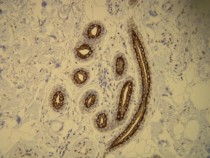ARG10564
anti-Cytokeratin 16 antibody [R20-S]
anti-Cytokeratin 16 antibody [R20-S] for IHC-Formalin-fixed paraffin-embedded sections and Human
Overview
| Product Description | Rabbit Monoclonal antibody [R20-S] recognizes Cytokeratin 16 |
|---|---|
| Tested Reactivity | Hu |
| Tested Application | IHC-P |
| Host | Rabbit |
| Clonality | Monoclonal |
| Clone | R20-S |
| Isotype | IgG |
| Target Name | Cytokeratin 16 |
| Antigen Species | Human |
| Immunogen | Synthetic peptide around the C-terminus of Human cytokeratin 16 |
| Conjugation | Un-conjugated |
| Alternate Names | KRT16A; K16; FNEPPK; Cytokeratin-16; PC1; K1CP; Keratin-16; CK-16; CK16; NEPPK; Keratin, type I cytoskeletal 16 |
Application Instructions
| Application Suggestion |
|
||||
|---|---|---|---|---|---|
| Application Note | * The dilutions indicate recommended starting dilutions and the optimal dilutions or concentrations should be determined by the scientist. |
Properties
| Form | Liquid |
|---|---|
| Buffer | 20 mM Tris-HCl (pH 8.0), 0.05% Sodium azide and 20 mg/ml BSA |
| Preservative | 0.05% Sodium azide |
| Stabilizer | 20 mg/ml BSA |
| Storage Instruction | For continuous use, store undiluted antibody at 2-8°C for up to a week. For long-term storage, aliquot and store at -20°C or below. Storage in frost free freezers is not recommended. Avoid repeated freeze/thaw cycles. Suggest spin the vial prior to opening. The antibody solution should be gently mixed before use. |
| Note | For laboratory research only, not for drug, diagnostic or other use. |
Bioinformation
| Database Links | |
|---|---|
| Gene Symbol | KRT16 |
| Gene Full Name | keratin 16, type I |
| Background | The protein encoded by this gene is a member of the keratin gene family. The keratins are intermediate filament proteins responsible for the structural integrity of epithelial cells and are subdivided into cytokeratins and hair keratins. Most of the type I cytokeratins consist of acidic proteins which are arranged in pairs of heterotypic keratin chains and are clustered in a region of chromosome 17q12-q21. This keratin has been coexpressed with keratin 14 in a number of epithelial tissues, including esophagus, tongue, and hair follicles. Mutations in this gene are associated with type 1 pachyonychia congenita, non-epidermolytic palmoplantar keratoderma and unilateral palmoplantar verrucous nevus. [provided by RefSeq, Jul 2008] |
| Function | Epidermis-specific type I keratin that plays a key role in skin. Acts as a regulator of innate immunity in response to skin barrier breach: required for some inflammatory checkpoint for the skin barrier maintenance. [UniProt] |
| Calculated MW | 51 kDa |
Images (1) Click the Picture to Zoom In






